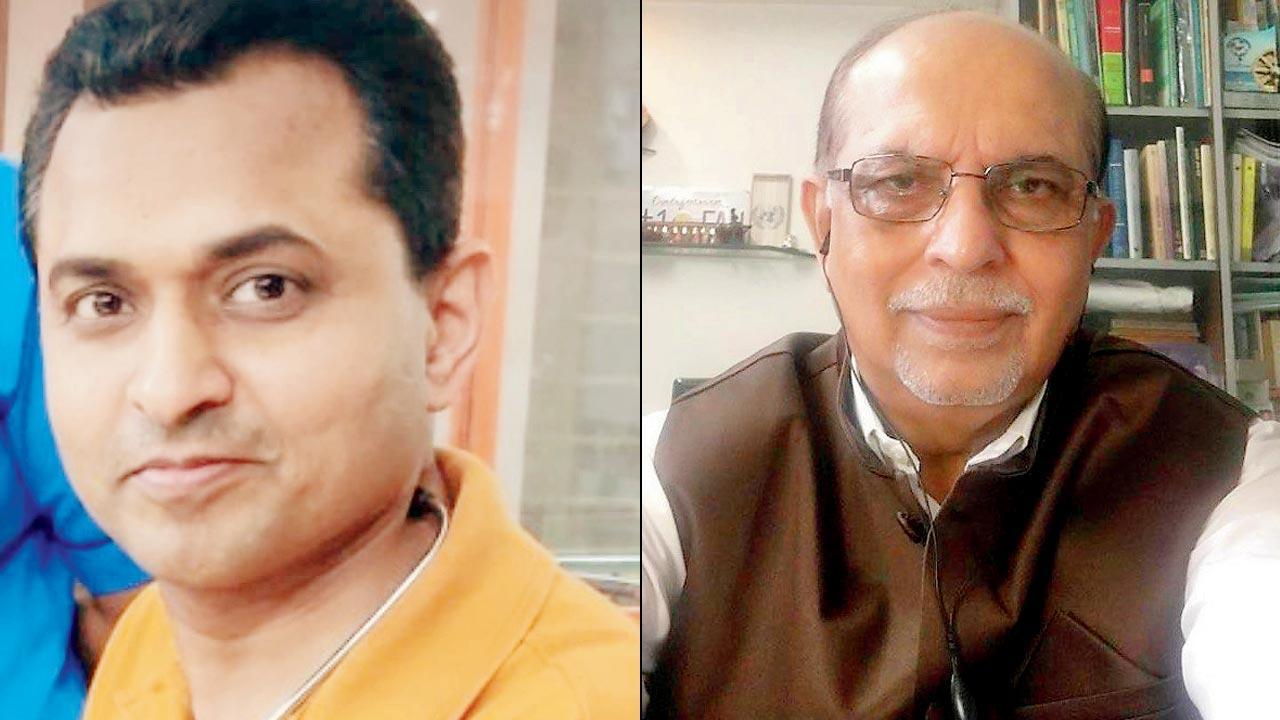Timely treatment of Multisystem Inflammatory Syndrome, which can start between two and 12 weeks after COVID, important; preventive measures in children and vaccination of adults key, they stress

Dr Fazal Nabi, director-Paediatrics, Jaslok Hospital (right) Dr Subhash Hira, Professor of Global Health, University of Washington-Seattle
AMID the recent death of a seven-year-old Kalamboli boy due to Multisystem Inflammatory Syndrome and more such fatalities across the world, health experts have expressed concerns over the inflammatory disease, underscoring the need for its timely treatment.
ADVERTISEMENT
MIS C (children) and A (adults) can present 2 to 12 weeks after Covid-19 and is seen in 1-2 per cent patients. In the case of Std II student Shreyash, reported by mid-day on July 12, the child died due to MIS, though his parents claimed he had no Covid symptoms.
Dr Wiqar Shaikh, professor of medicine, Grant Medical College and Sir JJ Group of Hospitals, said MIS, which involves swelling of the heart, lungs, brain and nerves, kidneys and skin, is one of the many conditions, triggered by Covid. He said it results in dysregulation of the body’s immune system causing damage to blood vessels in multiple organs. Citing a Lancet article of September 2020, Dr Shaikh said MIS’ symptoms include fever, muscle pain, diarrhoea, vomiting, conjunctivitis, breathlessness, dizziness, skin rash, heart and kidney failure. MIS also mimics Kawasaki’s disease, another inflammatory condition, in children. However, MIS due to Covid is far more virulent, he said.
Also read: Covid-19 cases in Mumbai remain stable
Dr Shaikh said there is no definitive test for MIS, but the estimation of C-reactive protein, ferritin levels, procalcitonin and Interleukin-6 levels could provide circumstantial evidence. He said anti-inflammatory drugs such as corticosteroids and Intravenous ImmunoGlobulin are given to patients. A drug called Anakinra, originally marketed for rheumatoid arthritis, has now been used in MIS with success.
Dr Subhash Hira, Professor of Global Health, University of Washington-Seattle, said, “MIS occurs after a few weeks of recovering from acute Covid illness or a few weeks after the second jab of a vaccine with symptoms like high-grade fever, muscular and joint pains and swellings, nausea, vomiting and diarrhoea, and a faint non-itchy rash on the body. These are associated with signs of multisystem inflammation such as high heart rate of >140/min with myocarditis, high proteinuria of >300 ug, uncontrolled hypertension, uncontrolled or recently precipitated diabetes mellitus, brain inflammation called encephalopathy, etc,”
Dr Hira said, “They [MIS patients] improve well with therapy of intravenous steroids, dexamethasone 6 mg daily. The syndrome is potentially more complicated in adults than in children.” In the case of elderly patients, body pain and swellings remain for several months, he said.
Paediatric expert view
Dr Fazal Nabi, Director Pediatrics, Jaslok Hospital, said, “Symptoms of MIS-C include fever for more than 3 days along with rash/conjunctivitis /diarrhea/vomiting/ abdominal pain. Diagnosis is often made if clinical symptoms along with laboratory reports suggest Covid-19 induced inflammation, which should follow the diagnostic criteria as per Directorate General of Health Services (MOHFW, Government of India).”
Dr Nabi said MIS-C often has symptoms seen in other fevers and bacterial infections and some patients fully recover without getting diagnosed. Children suffering from MIS-C are often less than 1 per cent of the total Covid-19 infected population, said the expert.
Dr Nabi said they still do not know how to prevent post-Covid response of the body so it’s better to prevent active infection by following a host of measures—vaccination of 18+ population; social distancing along with cough etiquette, hand hygiene, well-ventilated rooms and cleaning or disinfection of frequently used surfaces/linen.
With the new Delta variant expected to trigger a third wave, Dr Nabi suggested measures to keep children safe. He said a mask is not recommended for kids under 5 years, while those between 6-11 years may wear it under adult supervision. Hands must be kept clean while handling masks, with soap water or alcohol based handrub. If a child is infected with mild symptoms or isolated at home, it is advised that he/she is accompanied by a caretaker who has either recovered or received vaccination, he said.
Also, grandparents should be asked to stay away from children when they are isolated. While good nutrition of the child is to be maintained throughout along with routine hygiene measures, immunisation of the whole family will prevent severe infection in any of them in the 3rd wave, if it comes.
CDC criteria for MIS-A
>> Severe illness requiring hospitalisation in a person aged ≥21 years.
>> Positive test result for current or previous SARS-CoV-2 infection (nucleic acid, antigen or antibody) during admission or in the previous 12 weeks
>> Severe dysfunction of one or more organ systems (eg, hypotension or shock, heart dysfunction, arterial or venous thrombosis or acute liver injury)
>> Laboratory evidence of severe inflammation (eg, raised C Reactive Protein, Ferritin, D-Dimer or Interleukin-6)
>> Absence of severe respiratory illness is also a key finding
 Subscribe today by clicking the link and stay updated with the latest news!" Click here!
Subscribe today by clicking the link and stay updated with the latest news!" Click here!






